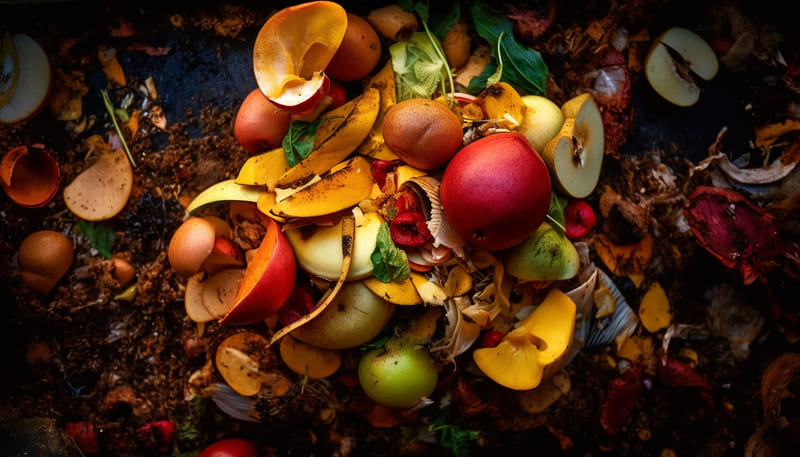By working together, we can reduce food waste, conserve resources, and ensure food security for all.
Disclaimer: This article was originally written during this year’s Holy Month of Ramadan.
Food waste is a global problem that has reached alarming proportions. According to the Food and Agriculture Organization of the United Nations (FAO), an estimated 1.3 billion tonnes of food produced for human consumption is wasted annually. This represents a significant loss of resources and has serious implications for food security, environmental sustainability, and economic development.
Indonesia is among the world’s top food wasters. A 2021 study found that an alarming 37,000 tonnes of solid waste are generated daily in Indonesia, of which 45% is food waste. Of this food waste, a staggering 3,000 tonnes are edible food. The problem of food waste in Indonesia is exacerbated by several factors, including a lack of awareness, inadequate infrastructure, and cultural practices that encourage overconsumption.
Religiosity and Food Consumption Culture in Indonesia
Islam, the dominant religion in Indonesia, places a high value on food and discourages waste. The Quran explicitly condemns extravagance and wastefulness, stating that “Allah does not love the wasteful.” The Islamic teachings also emphasise the importance of gratitude for Allah’s blessings, including food.
Despite these religious teachings, food waste remains a significant problem in Indonesia. This suggests that religiosity alone is not sufficient to curb food waste behaviour. Other factors, such as cultural norms and social pressures, may also play a role.
Indonesia has a rich and diverse food culture that is deeply intertwined with social customs and traditions. Food plays a central role in Indonesian hospitality, celebrations, and religious observances. However, certain cultural practices may also contribute to food waste. For example, the tradition of preparing large quantities of food for guests, even if it means that some of it will go to waste, is common in Indonesia.
Ramadan and Food Waste
The holy month of Ramadan, a period of fasting, prayer, and reflection for Muslims, presents a unique challenge in terms of food waste. While Ramadan is a time for spiritual growth and self-discipline, it is also associated with increased food consumption and waste.
During Ramadan, Muslims abstain from food and drink from dawn to sunset. However, after breaking the fast at sunset, many people tend to overeat, leading to increased food waste. While a study in Saudi Arabia found that food waste increases by 30 to 50% during Ramadan, a similar trend is observed in Indonesia. A 2021 study by the Indonesian Ministry of Environment and Forestry revealed that food waste in Indonesia surges by 15 to 20% during Ramadan. This increase can be attributed to several factors, including the preparation of excessive amounts of food for breaking the fast and sahur (pre-dawn meal), as well as the abundance of food available at Ramadan bazaars and buffets.
Green Ramadan: A Call for Sustainable Practices
To address the issue of food waste during Ramadan, the concept of “Green Ramadan” has gained traction in recent years. Green Ramadan is more than just a concept; it is a movement that encourages Muslims to align their consumption habits with Islamic values and environmental responsibility during the holy month.
Green Ramadan promotes a range of sustainable practices, including:
- Mindful Eating: Emphasising gratitude for food and avoiding overconsumption;
- Portion Control: Preparing and serving smaller food portions to minimise waste;
- Sustainable Food Choices: Opting for locally sourced and seasonal ingredients, and reducing meat consumption;
- Reduction of Single-Use Plastics: Using reusable containers, bottles, and bags;
- Food Scraps Composting: Turning food waste into valuable fertiliser for gardens or farms.
Green Ramadan initiatives often involve community engagement through workshops, cooking demonstrations, and awareness campaigns. These activities provide practical tips and resources for individuals and families to adopt sustainable practices during Ramadan and beyond.
The Role of the Food Industry in Food Waste
While individual and household food waste are significant contributors to the problem, the food industry also plays a crucial role. Food loss occurs throughout the supply chain, from production and processing to distribution and retail.
Several factors contribute to food loss in the food industry, including:
- Poor infrastructure and handling practices, which can lead to spoilage and damage of food products;
- Producing more food than can be sold or consumed, leading to surplus and waste;
- Rejecting produce based on appearance, even if it is perfectly edible, which contributes to food waste as well, and;
- Poor inventory control and forecasting, which can result in overstocking and expired products.
Addressing food waste in the food industry requires a systemic approach, including:
- Implementing better logistics, storage, and transportation practices to reduce food loss;
- Accurately forecasting demand and adjusting production levels to minimise surplus;
- Accepting and utilising produce with minor imperfections, and;
- Using technology and data analysis to improve inventory control and reduce waste.
Policy Implications and Recommendations
The problem of food waste in Indonesia requires a multi-faceted approach that addresses the underlying causes. Policy-makers need to implement strategies that raise awareness, improve infrastructure, and promote sustainable food consumption practices.
The government of Indonesia has taken some steps to address the issue of food waste. Back in 2017, the National Development Planning Agency launched the National Action Plan for Food Loss and Waste Reduction. The plan aims to reduce food loss and waste by 50% by 2030.
Beyond government actions, individuals and communities can actively participate in curbing food waste. This involves educating the public about the ramifications of food waste, encouraging meal planning to prevent excessive purchases and cooking, promoting proper food storage techniques to avoid spoilage, advocating for composting food scraps to minimise waste and generate fertiliser, and facilitating the donation of surplus food to food banks or charities.
Conclusion
Food waste is a complex issue with multiple causes. In Indonesia, the interplay between religiosity, food consumption culture, and food waste is particularly intricate. While Islam discourages waste, cultural practices and social pressures may contribute to food waste behaviour. The holy month of Ramadan presents a unique challenge in terms of food waste, as it is associated with increased food consumption and waste.
The Green Ramadan initiative offers a promising approach to address the issue of food waste during the holy month. By promoting sustainable practices and raising awareness about mindful consumption, Green Ramadan can help to reduce food waste and foster a more environmentally conscious society.
Addressing the problem of food waste in Indonesia requires a concerted effort from all stakeholders. Policy-makers need to implement strategies that raise awareness, improve infrastructure, and promote sustainable food consumption practices. Individuals and communities can also play a role in reducing food waste by adopting mindful consumption habits and supporting initiatives that promote food waste reduction.
By working together, we can reduce food waste, conserve resources, and ensure food security for all.
This opinion piece was written by Taufiq Ihsan: an assistant professor at the Environmental Engineering Department of Universitas Andalas, Indonesia. Any opinions expressed in this article are those of the author and do not necessarily reflect the views of Indonesia Expat.




